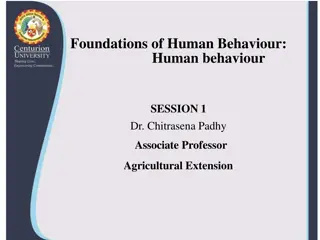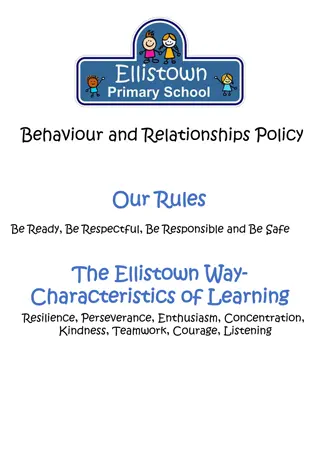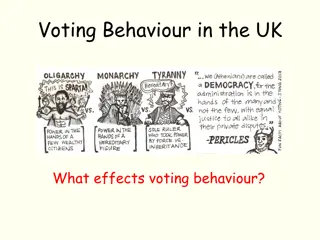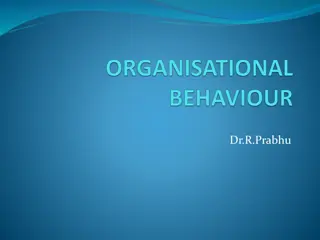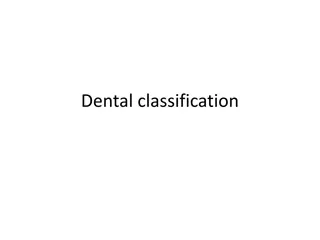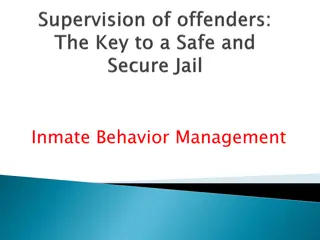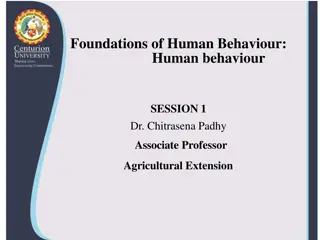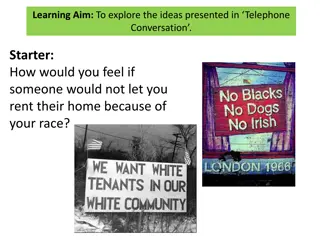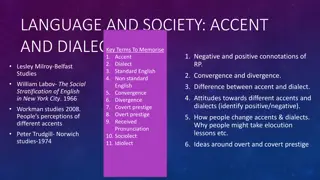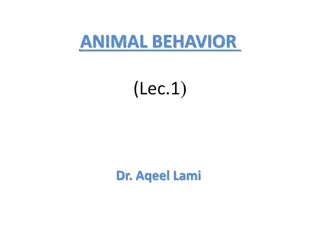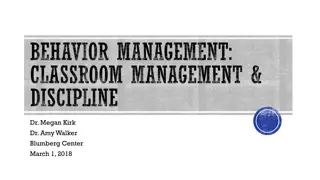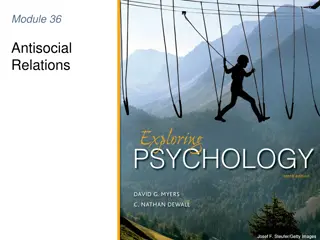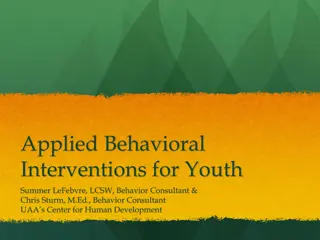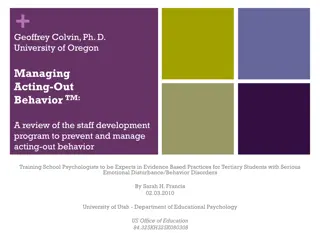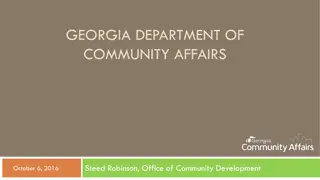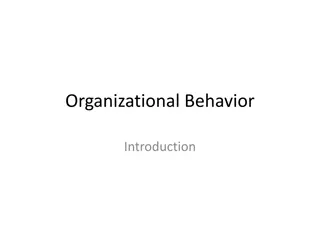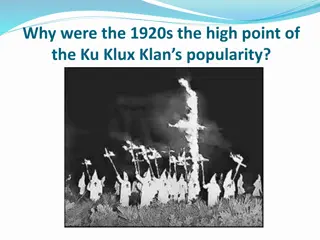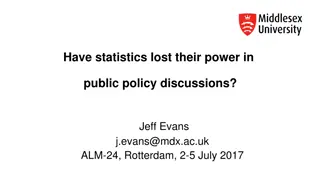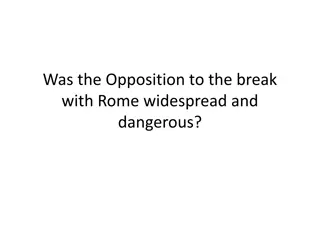Positive Behavior Support Interventions in Education
Learn about Tier 1 Positive Behavior Interventions & Supports (PBIS) developed by California State University and LA Unified School District. Explore evidence-based strategies like effective transitions, praise, choice-making, and establishing routines to promote positive behavior in students. Disco
1 views • 10 slides
Function Based Thinking
Function-based thinking in Missouri Schoolwide Positive Behavior Support, emphasizing data-based decision-making, mission clarity, and effective teaching practices. Understand how behavior is related to the environment and how environmental interventions play a key role in shaping expected behaviors
6 views • 27 slides
Narration and Focalization
Unveil the intricate layers of narration and focalization in storytelling, delving into the impact of the narrator on the story's perception. From the nuances of narration in literature to the complexities of narration in audiovisual content, uncover the diverse facets that shape the fictional world
0 views • 36 slides
Addressing Predatory Behavior in the Fellowship
Predatory behavior, especially towards vulnerable members, is a concerning issue in the fellowship. This behavior includes unwelcome advances, exploitation of power dynamics, and institutional sexism. The discussion on predatory behavior necessitates honest dialogue and a united approach for a safer
3 views • 13 slides
Understanding Human Behavior: Foundations and Complexity
Human behavior encompasses the actions and interactions of individuals influenced by factors like genetics, culture, and situational contexts. It involves observable overt behaviors as well as hidden covert behaviors, with a dynamic interplay between individuals and their environments. Psychologists
8 views • 20 slides
GD Bart Puppy Test: Behavior Scoring System Overview
The GD Bart Puppy Test is a standardized behavioral scoring system designed for puppies at 8 weeks of age, focusing on 21 test components to predict success in canine behavior. Conducted by a team of 3 people, the test evaluates stress signals and responsiveness levels to various stimuli. Multiple e
6 views • 15 slides
Understanding the Role of Board-Certified Behavior Analysts in Supporting Students with Autism in PA School Programs
Pennsylvania Training and Technical Assistance Network (PaTTAN) plays a crucial role in supporting students with autism through the efforts of Board-Certified Behavior Analysts. The increasing number of students eligible for IEPs under the definition of autism necessitates skilled educators who can
0 views • 20 slides
Influencing Factors on Voting Behavior: A Comprehensive Analysis
In the realm of voting behavior, factors such as media, social class, age, gender, and more play critical roles. This essay delves into the complexity of factors influencing voting behavior, assessing their relative importance and the balance of their impact. The discussion includes models of voting
0 views • 12 slides
Behavior and Relationships Policy at Ellistown Primary School
Ellistown Primary School aims to create a safe and respectful environment where everyone is ready to engage in learning. The Behavior and Relationships Policy emphasizes positive behavior reinforcement, clear boundaries, and promoting self-esteem. It focuses on fostering good citizenship, teaching s
0 views • 11 slides
Understanding Psychological Theories of Criminal Behavior
Psychologically-based criminologists attribute criminal behavior to individual factors such as negative early childhood experiences and inadequate socialization, leading to criminal thinking patterns and incomplete cognitive development. Probation and parole practices are influenced by rehabilitatio
0 views • 30 slides
Understanding Voting Behavior in the UK
Voting behavior in the UK is influenced by various factors such as social class, age, location, single issues, party leadership, and media impact. Traditionally, voting behavior was predictable, but recent trends show a shift in party loyalty. Factors such as social class have historically played a
0 views • 26 slides
Understanding Organizational Behavior and Characteristics
Organizational behavior explores how individuals behave in various contexts such as child, IPS officer, businessman, etc. An organization is a consciously coordinated unit comprising two or more individuals working towards common goals. Characteristics of an organization include deliberate creation,
2 views • 41 slides
Understanding Consumer Behavior in Marketing
The design of a marketing program starts with understanding consumer behavior. Consumers, as the end users, play a crucial role in shaping market trends. Producers seek insights into consumer personas, market behaviors, and influencing factors. Management focuses on the consequences of consumer beha
2 views • 26 slides
Understanding English Imperative Sentences
English imperative sentences function as directives or commands, characterized by having no overt subject noun phrase, using an implicit second-person pronoun (you) as the subject, being tenseless with the base form of the verb, always indicating future actions, and not occurring in subordinate clau
1 views • 22 slides
Understanding Psychology: The Science of Behavior and Mental Processes
Psychology is the scientific study of behavior and mental processes. Psychologists study both observable behavior and private mental processes. The primary goals of psychology are to describe, understand, predict, and control behavior. Different branches of psychology, such as applied psychology, cl
2 views • 29 slides
Canine and Feline Dental Classification and Grading Scale
Learn about the dental classification and grading scale for dogs and cats, ranging from Grade 0 (no plaque or gingivitis) to Grade 4 (overt peri-dontal disease). Each grade describes the level of tartar, gingivitis, infections, pain, and necessary actions for treatment. It provides insights into the
1 views • 7 slides
Understanding Inmate Behavior Management in Correctional Settings
Inmate Behavior Management in correctional facilities involves supervising inmates, implementing corrective discipline, and fostering a fair and consistent environment. It emphasizes the importance of behavior management plans, identifying undesirable traits in supervision, and passing educational a
0 views • 19 slides
Understanding Human Behavior: Foundations and Factors
Human behavior is a multifaceted subject influenced by genetic makeup, culture, and individual values. It encompasses both overt actions and covert thoughts, a product of the individual and environmental factors. Psychologists study behavior from visible (overt) actions like playing football to inne
0 views • 20 slides
Understanding Normal and Abnormal Behavior: Perspectives and Definitions
Normal behavior varies from person to person and society, influenced by individual preferences and societal norms. Abnormal behavior is characterized by an inability to function effectively or personal discomfort. The concept of normality and abnormality in psychology raises complex questions about
2 views • 8 slides
Exploration of Race and Identity in Telephone Conversation
The poem "Telephone Conversation" by Wole Soyinka delves into the themes of race, identity, and societal prejudices through a phone dialogue between a man and a landlady. The man's experience of discrimination based on his skin color unfolds in a conversation filled with subtle and overt racism, hig
0 views • 10 slides
Understanding Language Variation and Social Identity
Language and society are intricately connected through accent, dialect, standard English, and non-standard English. The concepts of convergence, divergence, covert prestige, and overt prestige influence how identity is formed. This text delves into regional dialects and accents, highlighting the dif
3 views • 63 slides
Understanding Human Behavior: Insights for Social Workers
This material delves into the intricacies of human behavior, exploring factors influencing behavior such as heredity, environment, intelligence, needs, and motives. It covers the concept of human behavior, stages in life from conception to old age, and theories of human development by eminent psycho
2 views • 71 slides
Understanding Animal Behavior and Ecology
Animal behavior encompasses a range of activities such as feeding, breeding, and social interactions. Ethology focuses on studying behavior in natural environments, while behavioral ecology examines ecological aspects like predator-prey interactions. Sociobiology delves into the evolution of social
3 views • 5 slides
Understanding Behavior Management in Classroom Settings
Explore the essential topics of behavior management, classroom strategies, and discipline in educational settings. Delve into the functions of behavior, impact of trauma on learning, and effective management techniques. Learn how to identify underlying reasons for student behaviors, discuss behavior
0 views • 76 slides
Targeting Emotions to Facilitate Behavior Change in Older Adults
Efforts in changing health behavior have traditionally focused on social and cognitive factors, but recent evidence highlights the importance of affective states in decision-making and behavior change. Janey Peterson discusses the role of emotions in achieving and sustaining behavior change to benef
0 views • 11 slides
Grading Criteria for Effort and Behavior in Educational Reporting
Effort and behavior in educational settings are evaluated based on criteria ranging from Excellent to Causing Concern. Pupils demonstrating excellent behavior show respect, responsibility, and positive engagement in learning. Those with good behavior exhibit cooperation and respect for others, albei
0 views • 9 slides
Understanding Prejudice: Roots, Manifestations, and Impact on Society
Prejudice is an unjustified negative attitude towards a group, stemming from beliefs, emotions, and predispositions to discriminate. This negative behavior can lead to discrimination, affecting various aspects of society such as job opportunities and relationships. Despite a decline in overt prejudi
0 views • 20 slides
Understanding Applied Behavior Analysis (ABA) for Youth Interventions
Applied Behavior Analysis (ABA) is a science focusing on improving human behavior by increasing desired behaviors, teaching new skills, and generalizing behaviors. ABA emphasizes observable behaviors, measurement of behavior change, and the use of interventions in various settings like classrooms an
0 views • 25 slides
PBIS Expectations and Behavior Flowchart
The PBIS flowchart outlines behavior expectations and interventions for minor and major incidents in a school setting. It covers disrespectful behavior, disruption, defiance, property damage, theft, possession of weapons, and more. The flowchart guides teachers and staff on managing and addressing s
0 views • 6 slides
Managing Acting-Out Behavior: A Staff Development Program Review
This review discusses a staff development program created by Geoffrey Colvin, Ph.D., from the University of Oregon, focusing on preventing and managing acting-out behavior in students with emotional disturbance or behavior disorders. The program includes video presentations, strategies for behavior
0 views • 22 slides
Ensuring Fair Housing: Laws, Enforcement, and Protected Classes in Georgia
Fair housing laws aim to provide equal opportunity and non-discriminatory treatment to individuals within protected classes in Georgia. The state enforces substantially similar laws to federal statutes, recognizing seven protected classes. Discriminatory conduct triggers such as overt discrimination
0 views • 31 slides
Management of Lower GI Bleeding: Initial Evaluation and Resuscitation
Lower gastrointestinal bleeding, originating distal to the ligament of Treitz, often presents with overt or occult symptoms. Initial management involves hemodynamic stabilization, localization of the bleed site, and tailored therapeutic interventions. Key steps include IV fluid resuscitation, monito
0 views • 44 slides
Understanding Organizational Behavior and Individual Behavior
Organizational Behavior (OB) is a multidisciplinary field that combines knowledge from various disciplines to study and manage organizations effectively. It emphasizes the application of this knowledge to enhance organizational effectiveness and the well-being of participants. OB is a useful concept
0 views • 38 slides
Societal Divisions and Racial Tensions in 1920s America
The 1920s in America were marked by a rise in popularity of the Ku Klux Klan, with millions of members at its peak. Segregation laws like Jim Crow enforced racial divides, especially in the South, while the North saw less overt racism but still faced inequality. The era was characterized by societal
0 views • 15 slides
Function-Based Behavior Support Plans: A Comprehensive Guide
Explore the process of developing Function-Based Behavior Support Plans (BSP) using Functional Behavioral Assessment (FBA). Understand the concepts of function and functional behavior assessment, learn how FBA/BSP fits within a multi-tiered support system, and practice developing BSP for students. D
0 views • 74 slides
Contemporary Crisis of Statistics in Public Policy Discussions
Contemporary public policy discussions are facing a crisis in the utilization of statistics. There is a lack of trust in statistical data, leading to a decline in its authority. This overt crisis is related to post-truth politics, fake news claims, and the absence of generally accepted baselines for
0 views • 15 slides
Russian Economic Warfare in Central and Eastern Europe: Challenges and Impacts
Russia employs overt and covert economic warfare tactics in Central and Eastern Europe, including energy blockages and media manipulation. This strategy poses challenges to democratic values and institutions. The study examines the correlation between Russia's economic footprint and democratic stand
0 views • 24 slides
Unmarked Locatives in Western Armenian: A Linguistic Analysis
Explore the phenomenon of Unmarked Locatives in Standard Western Armenian, discussing the external and internal structure, syntactic distribution, and the absence of overt marking. Examples highlight the unique features and contrast with Standard Eastern Armenian.
0 views • 36 slides
Opposition to the Break with Rome in 16th Century England
The opposition to the break with Rome during the reign of Henry VIII in 16th century England was notable, leading to executions of prominent figures like Sir Thomas More and Bishop John Fisher. Despite some limitation of overt opposition, the English people were deeply connected to the papacy. The s
0 views • 12 slides
Community Eligibility Provision (CEP) - Fueling Student Achievers
Providing an alternative to household applications for free and reduced-price meals, the Community Eligibility Provision (CEP) under the Healthy, Hunger-Free Kids Act aims to offer all students free meals in high-poverty areas without the need for individual applications. Implemented over three year
0 views • 11 slides




